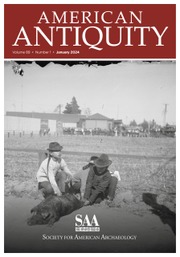No CrossRef data available.
Article contents
Ancient Settlements in the Main River Valley, Chukchi Peninsula
Published online by Cambridge University Press: 20 January 2017
Abstract
A newly discovered late Neolithic culture of riverine hunters and fishermen becomes the third major culture known in the Chukchi-Koryak region of Northeast Asia. The arctic maritime hunters ancestral to the Eskimo have long been known, and recently evidence for an inland group of hunters in the northern reindeer and fish areas has been encountered. The Neolithic hunters and fishers lived in temporary, probably winter camps of semisubterranean houses near the game-rich mouths of tributaries on the well-drained gravel floodplains of the river valleys of the Anadyr-Penzhina lowlands. Collections from Vakernaia 1 and 2 in the Main River valley are described. Chipped stone artifacts with pressure retouch include some obsidian knives, and trapezoidal and semilunar knives made on pebble flakes. There are grinder picks, polished slate knives of ulo type, and adzes including a form comparable to the splitting adz of the Chugach sequence in southern Alaska. Picks or mattocks were made of walrus tusk and antler. The bulk of the collection consists of pottery. Hemispherical vessels of great size variation are plain, textile-impressed, and stamped. Although house type, the walrus tusk, and the ulo knives suggest some connection with the Bering Sea hunting cultures, the basic traits appear to be of more local origin.
- Type
- Research Article
- Information
- Copyright
- Copyright © The Society for American Archaeology 1962




